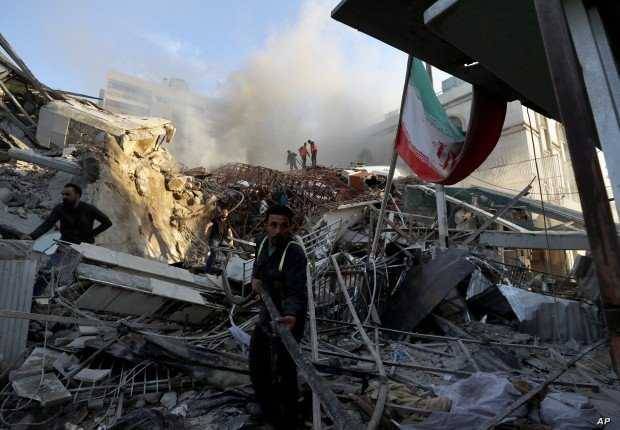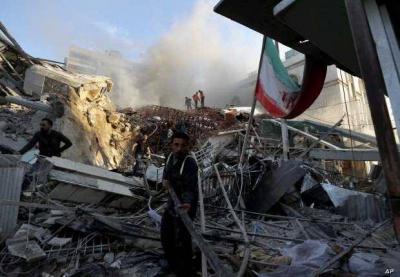Yesterday, threats escalated between Iran and Israel following the death of seven members of the Iranian Revolutionary Guards, including two high-ranking officers, in an Israeli airstrike that destroyed the Iranian consulate building in Damascus last Monday. The threats suggested that a military action could be initiated by one of the parties. Will Iran be the first to deliver a retaliatory strike against Israel, or will Israel once again take the military initiative, leaving Tehran and its proxies without the opportunity to leverage this waiting period for their benefit?
As the tense situation in the region unfolds, thousands in Tehran and other Iranian cities chanted anti-U.S. and anti-Israel slogans during observances of "Quds Day," coinciding with the funerals of the seven military personnel. The Commander-in-Chief of the Revolutionary Guards, Major General Hossein Salami, reiterated his vow to "punish" Israel during his speech at the ceremonies, as reported by "Call of the Homeland."
In Lebanon, Hezbollah Secretary-General Hassan Nasrallah confirmed that the Iranian response to the targeting of the consulate in Damascus is "inevitable," arguing that this attack marked a "turning point" in events since October 7. Regarding the open front in the south, he stated, "This war was avoided by the Israelis from the first day because the enemy's leadership knows what it means to go to war with Lebanon. The main weapons after what we've revealed, and the core forces after we have used them. Meanwhile, they are achieving these successes in the north; just ask the Israelis about it."
On the subject of "talking about a comprehensive war on Lebanon," he commented, "You are not finished in Gaza. But we tell the enemy, the friend, and those fools that this resistance in Lebanon does not fear a war." Nasrallah also announced that "the party" will hold a commendation ceremony for the martyrs of the attack on the consulate at 4 p.m. next Monday.
In contrast, Israeli Security Minister Yoav Galant stated, "We are delivering strong and precise strikes against the enemy, and the ensuing damage is difficult in all locations; therefore, they are looking for ways to retaliate, which could come from anywhere, and we are ready for that." Galant made his comments during a visit to the Israeli Air Force base at "Tal Nof" amid heightened Israeli alert following the consulate bombing. He added, "We attack wherever Israel decides against the enemy; it could be in Damascus and also in Beirut."
He continued, "Israel relies on the army, and the latter relies on the air force. We know this very well, and so does the enemy; thus, they will always attempt to harm the air force to disrupt this machine called the air force." He asserted that "readiness means strong defense on the ground, as well as in the air. Defense, readiness, vigilance, and preparedness are not synonymous with fear and panic. We are stronger and more prepared, and we will know how to defend ourselves and be effective in the right place."
On the ground in the south, three members of the "Amal" Movement were killed in Marjeyoun, which experienced its first Israeli airstrike since the onset of hostilities on October 8. The Israeli aircraft targeted a house previously occupied by the leader of the "South Lebanese Army," Antoine Lahad. The movement mourned the three individuals: Musa Abdul Karim Al-Moussawi, born in 1977 from Nabi Sheet, Muhammad Ali Wahbi, born in 1987 from Khyam, and Muhammad Dawoud Sheet, born in 1992 from Kfar Kila. Meanwhile, Hezbollah mourned two members killed in an Israeli strike on Aita al-Shaab: Bilal Haidar Halal “Sajid,” born in 1996 from Qana, and Ali Nasir Abdul Ali “Kafil,” born in 1998 from Aita.
For its part, the Israeli army reported that "a soldier was wounded due to a rocket launched from Lebanon at the Mettula settlement." In operations by Hezbollah, it was stated that they targeted "enemy troops and vehicles in the Malakieh position with artillery and rocket fire," according to "Call of the Homeland."




